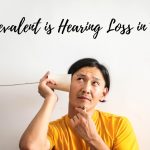Hearing Loss is Far More Common Than Most People Assume
A shocking percentage of the American population lives with some detectable degree of disabling hearing loss. It is impossible to know an exact number for all sorts of reasons, but the best estimates are that 38-48 million people suffer from it. That’s more than 13% of the total population aged 18 and above.
Less than three out of every 1,000 births involve congenital hearing loss, but so many common professional and recreational activities can lead to hearing loss that the percentage of the population affected steadily increases with age. By the time we are considering people aged 18-44, over 6% already have hearing loss. More than one out of every three people aged 65 and older has it and by the time people reach the age of 75 they are more likely to have hearing loss than not. This means more than 50% of everyone aged 75 and above lives with hearing loss.
Troubling as these statistics may be, they become more troubling when you understand how intimately your hearing health is related to your overall health. And perhaps most tragic of all is this statistic: less than 20% of everyone who suffers from hearing loss seeks and maintains an appropriate treatment program. That is so many people living with all manners of health concerns that they do not need to be dealing with. And consider how much unnecessary trouble it means for each individual.
Why Might People Fail to Address Their Hearing Loss
Hearing loss can be difficult to recognize. Trouble hearing is frequently easier to notice in others than in ourselves because of course we normalize our own five senses. In a small number of cases hearing loss is the result of some kind of sudden accident like an extremely loud blast that causes instant damage. But most often it comes on so gradually that you just adapt to your diminished sense of hearing without even noticing that you are doing so. But obviously you do notice if you enter a loved one’s home and their television or radio is blaring at an uncomfortable volume, or every time you visit they ask you to repeat yourself over and over.
And sadly, even when people do recognize their own hearing loss, there are all sorts of psychological barriers in place in all of us that might cause any of us to resist admitting it to ourselves. For example, if someone does know how common hearing loss actually is, they are likely to minimize its seriousness, figuring if so many people live with it then it can’t be that bad. Downplaying its seriousness is a way for people to shirk their accountability to address it. There are all kinds of outdated stereotypes surrounding hearing loss. For many people, admitting to hearing loss would require them to overcome these prejudices, prejudices which they likely are not even aware that they have.
The Dangers of Downplaying Hearing Loss
Hearing loss is not just some minor inconvenience. Our sense of balance depends on our hearing. Hearing troubles lead to a loss of equilibrium and trouble orienting yourself spatially. This makes even the most familiar spaces riskier. And the psychological and emotional damages that come with untreated hearing loss are immeasurable and compound upon each other.
Relationships suffer. Trust and intimacy require nuance and subtlety. This sort of natural rhythm becomes impossible when one person is asking the other to repeat themselves all the time. Before people even realize that they are having trouble hearing, they often begin to feel fatigued from socializing. It takes greater concentration than ever before to make out what people are saying when background noise is present.
So feeling fatigued, they begin to withdraw socially. This of course leads to loneliness, and loneliness frequently leads to depression. Oftentimes this tragic spiral leads to cognitive decline and disorientation, which obviously limit every aspect of one’s quality of life, from employment possibilities to even the possibility of feeling truly satisfied by time spent with family and friends.
Prevention and Treatment
It is never too early to begin taking preventative actions and it is never too late to start treatment. Hearing loss is permanent and irreversible and left untreated, your overall health will decline. But with appropriate treatment, tailored specifically to your unique needs, circumstances, and budget, there is no reason for you to not live a fully satisfied life. Make an appointment with one of our specialists today to take back control of your own quality of life.






